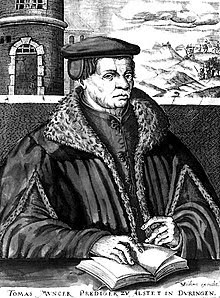How much one can discover by taking a bike ride and getting lost in the picturesque villages surrounding the Harz Mountains in Germany. In particular, thanks to a spontaneous and selfless guided tour of the Frose Church (Seeland), I've had the opportunity to learn about a less-known figure (at least for those who aren't German) who, in my opinion, played an even more significant role than Luther.
Indeed, long before Karl Marx and Friedrich Engels wrote the Communist Manifesto in 1848, Thomas Müntzer (1489-1525) undertook a remarkably similar endeavor. This theologian, preacher, and radical leader played a prominent role during the Protestant Reformation in Germany. Despite starting as a Catholic priest, Müntzer later embraced the ideas of Martin Luther's Protestantism.
However, as time progressed, Müntzer radicalized, distancing himself from Luther's teachings. He criticized Luther for not implementing a comprehensive reform and for maintaining a position he deemed too moderate toward the Catholic Church and rulers. His stance became even more radicalized due to peasant movements seeking social and economic improvements. Müntzer advocated for the abolition of serfdom and the creation of egalitarian Christian communities.
During the Peasants' War (1524-1525), Müntzer joined the rebellious peasants and became one of their leaders. However, they were decisively defeated in the Battle of Frankenhausen in 1525. He was captured and executed in May of that year. His legacy endures as a symbol of the struggle for social justice and opposition to oppressive structures. Although his methods and extreme visions were controversial, he is remembered as a martyr and an emblematic figure in the history of the Radical Reformation.
The notable aspect of this preacher was his theological vision of the Apocalypse and his belief in the imminent arrival of the Kingdom of God. He considered violence necessary to overthrow oppressive powers and establish a society based on Christian principles.
In summary, Müntzer can be considered a precursor to Christian communism, ahead of his time. The collegiate church of Frose pays tribute to him, as it was in this place where he conducted seminars in the early 16th century.
 |
Thomas Müntzer. Copperplate engraving by Christoph van Sichem (1608) |






Comentarios
Publicar un comentario